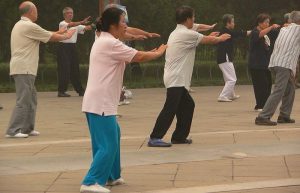Improve the Psychological Well-Being of Patients with Cardiovascular Disease with Tai Chi
By John M. de Castro, Ph.D.
“Tai Chi involves a series of graceful, gentle movements that can get your heart rate up while also relaxing your mind. It’s been called meditation in motion.” – Cleveland Heart Lab
Cardiovascular disease is the number one killer. A myriad of treatments has been developed including a variety of surgical procedures and medications. In addition, lifestyle changes have proved to be effective including quitting smoking, weight reduction, improved diet, physical activity, and reducing stresses. Unfortunately, for a variety of reasons, 60% of cardiovascular disease patients decline engaging in these lifestyle changes, making these patients at high risk for another attack.
Contemplative practices have been shown to be safe and effective alternative treatments for cardiovascular disease. Practices such as meditation, tai chi, and yoga, have been shown to be helpful for heart health and to reduce the physiological and psychological responses to stress. They have also been shown to be effective in maintaining cardiovascular health and the treatment of cardiovascular disease. The research has been accumulating. So, it makes sense to pause and take a look at what has been learned.
In today’s Research News article “Does tai chi improve psychological well-being and quality of life in patients with cardiovascular disease and/or cardiovascular risk factors? A systematic review.” (See summary below or view the full text of the study at: https://www.ncbi.nlm.nih.gov/pmc/articles/PMC8725570/ ) Yang and colleagues review, summarize, and perform a meta-analysis of the published randomized controlled trials of the effectiveness of Tai Chi practice for patients with cardiovascular disease. They identified 37 published trials.
They report that the published research found that Tai Chi practiced improved the psychological well-being of the patients including decreases in perceived stress, anxiety, depression, bodily pain and increases in mental health, self-efficacy, and mood.
Hence practicing Tai Chi improves the mental health and quality of life of patients with cardiovascular disease.
“practicing tai chi may help to modestly lower blood pressure. It’s also proved helpful for people with heart failure, who tend to be tired and weak as a result of the heart’s diminished pumping ability. The slow movements involve both the upper and lower body, which safely strengthens the heart and major muscle groups without undue strain.” – Harvard Health
CMCS – Center for Mindfulness and Contemplative Studies
This and other Contemplative Studies posts are also available on Twitter @MindfulResearch
Study Summary
Yang, G., Li, W., Klupp, N., Cao, H., Liu, J., Bensoussan, A., Kiat, H., Karamacoska, D., & Chang, D. (2022). Does tai chi improve psychological well-being and quality of life in patients with cardiovascular disease and/or cardiovascular risk factors? A systematic review. BMC complementary medicine and therapies, 22(1), 3. https://doi.org/10.1186/s12906-021-03482-0
Abstract
Background
Psychological risk factors have been recognised as potential, modifiable risk factors in the development and progression of cardiovascular disease (CVD). Tai Chi, a mind-body exercise, has the potential to improve psychological well-being and quality of life. We aim to assess the effects and safety of Tai Chi on psychological well-being and quality of life in people with CVD and/or cardiovascular risk factors.
Methods
We searched for randomised controlled trials evaluating Tai Chi for psychological well-being and quality of life in people with CVD and cardiovascular risk factors, from major English and Chinese databases until 30 July 2021. Two authors independently conducted study selection and data extraction. Methodological quality was evaluated using the Cochrane Risk of Bias tool. Review Manager software was used for meta-analysis.
Results
We included 37 studies (38 reports) involving 3525 participants in this review. The methodological quality of the included studies was generally poor. Positive effects of Tai Chi on stress, self-efficacy, and mood were found in several individual studies. Meta-analyses demonstrated favourable effects of Tai Chi plus usual care in reducing anxiety (SMD − 2.13, 95% confidence interval (CI): − 2.55, − 1.70, 3 studies, I2 = 60%) and depression (SMD -0.86, 95% CI: − 1.35, − 0.37, 6 studies, I2 = 88%), and improving mental health (MD 7.86, 95% CI: 5.20, 10.52, 11 studies, I2 = 71%) and bodily pain (MD 6.76, 95% CI: 4.13, 9.39, 11 studies, I2 = 75%) domains of the 36-Item Short Form Survey (scale from 0 to 100), compared with usual care alone. Tai Chi did not increase adverse events (RR 0.50, 95% CI: 0.21, 1.20, 5 RCTs, I2 = 0%), compared with control group. However, less than 30% of included studies reported safety information.
Conclusions
Tai Chi seems to be beneficial in the management of anxiety, depression, and quality of life, and safe to practice in people with CVD and/or cardiovascular risk factors. Monitoring and reporting of safety information are highly recommended for future research. More well-designed studies are warranted to determine the effects and safety of Tai Chi on psychological well-being and quality of life in this population.
